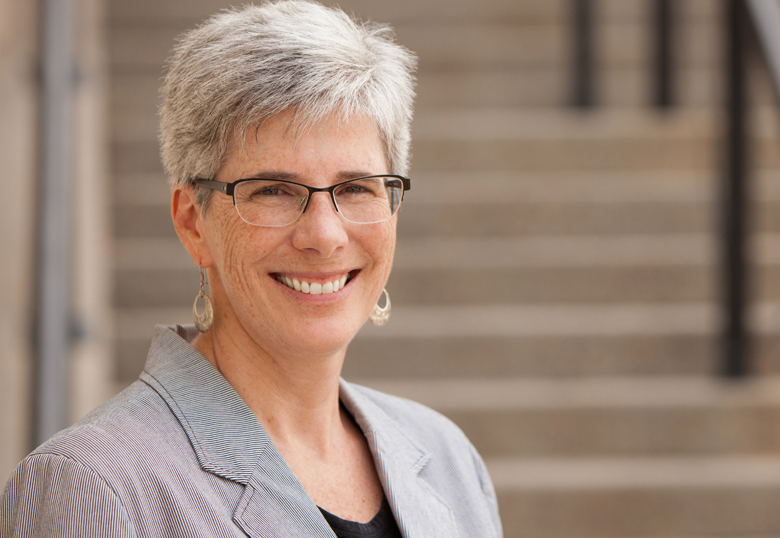The shingle is out and Dr. Christine Murray is eager to let the University of Lethbridge campus know that Alberta Innovates Bio Solutions is ready to support innovation in southern Alberta’s agriculture, forestry and life sciences sectors.

One of four arms of Alberta Innovates, the Bio Solutions Corporation embraces and supports new technologies and the creation of new ideas for the growing global bioeconomy. And for the first time, an office south of Calgary has been established.
“We want to increase our impact and as much as we have always worked with people and funded projects here in southern Alberta, this will give us a much larger presence,” says Murray, the director of Agriculture Technologies. “I’m hoping to connect in the areas of science, innovation and entrepreneurship relating to agriculture and forestry. AI Bio’s fundamental focus is funding research up to the point of commercialization.”
A New Brunswick native, Murray comes to the U of L most recently from Edmonton, but she is no stranger to southern Alberta. Alberta Agriculture recruited her out of the University of Guelph in 1995 while she was completing her PhD in woody plant physiology. She moved out west and took up residency in Brooks as she worked at the Crop Diversification Centre South.
A researcher herself, Murray eventually turned her focus to leadership and administration as she became the Director at the Crop Diversification Centre South and then moved to Edmonton to lead research groups there. Her role with AI Bio, where she started in 2010, includes all aspects of the research funding process and strategic development within AI Bio.
“When I was doing my PhD, I was always interested in the science and the people part of my environment,” she says. “The idea of leadership and helping people get to the next level appealed to me. I am excited by the field of science and working with people to advance science and technology, and I recognized I had many strengths to support that development.”
Murray is enthused about the opportunities her move to the U of L affords AI Bio, as well as researchers, innovators and industry in southern Alberta. With six strategic streams (sustainable production, bioindustrial innovation, food innovation, ecosystem services and biodiversity, biological greenhouse gas management program and prion and prion-like neurological diseases), its mandate is broad but impactful.
She points to some new and emerging programs under the overarching Alberta Bio Future (ABF) program from AI Bio that have been designed to spur economic and research activity in the bioindustrial sector throughout the province.
One such initiative, which debuted in March, is the ABF Equipment Utilization program. Its focus is on the scale-up and pilot development of bioindustrial products and bioindustrial technologies, and allows for companies to use publicly available, specialized equipment on a fee-for-service basis.
“Sometimes the message we hear from companies is that it’s too expensive to use this equipment and this is an opportunity to make it more accessible to them,” says Murray.
The ABF Product and Technology Commercialization program, launched in July, supports projects that focus on new bioindustrial products and bioindustrial technologies that will be commercialized within three years.
In the fall, an ABF Research and Innovation Program will kick off.
“That one is focused on the research organizations and academics across the province who are looking at advancing technologies in the bioindustrial sector,” says Murray.
AI Bio is there to remove barriers for researchers to get their ideas into the public sector and to maximize opportunities for forging valuable relationships with industry.
“We see a wide range of projects from industry and researchers and we have the unique opportunity to facilitate connections between industry and researchers,” she says. “Industry is always looking over the fence for a connection that makes sense to them.”
A trend Murray has seen developing is the application of multidisciplinary research to issues in the bioindustrial sector. Setting up shop in the U of L just as the Destination Project is taking shape, a space devoted to supporting a multidisciplinary atmosphere, is perfect timing.
“What we are seeing is that multidisciplinary research is becoming increasingly important and impactful,” she says. “We’ve funded a couple of different networks where you are seeing people from agriculture, forestry, chemistry and engineering working together to move an idea or a technology forward collectively.”
Murray, who has set up shop in Markin Hall (M4009), urges U of L faculty and staff to contact her with any questions or ideas that may be related to AI Bio funding and programming. She will be visible on campus and can be contacted at 403-382-7188 or christine.murray@albertainnovates.ca.
For more information on Alberta Innovates Bio Solutions, visit their website at bio.albertainnovates.ca.
